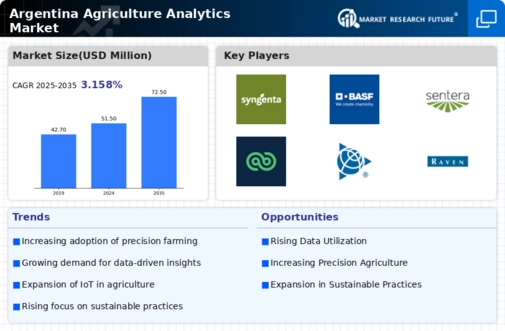Government Initiatives and Support
Government initiatives play a pivotal role in shaping the agriculture analytics market in Argentina. The Argentine government has been actively promoting the adoption of technology in agriculture through various programs and subsidies. These initiatives aim to enhance food security and boost agricultural productivity. For instance, the Ministry of Agriculture has launched several projects to support farmers in utilizing data analytics for better crop management. This support is crucial, as it encourages small and medium-sized enterprises to invest in agriculture analytics solutions. The agriculture analytics market is likely to benefit from these government efforts, with an expected increase in market penetration of analytics tools by 15% in the coming years.
Growing Focus on Climate Resilience
In Argentina, the agriculture analytics market is increasingly influenced by the growing focus on climate resilience. As climate change poses significant challenges to agricultural productivity, farmers are turning to analytics to develop adaptive strategies. By utilizing data on weather patterns, soil conditions, and crop performance, farmers can make informed decisions that enhance their resilience to climate variability. This trend is particularly relevant in regions prone to droughts and floods, where analytics can guide irrigation practices and crop selection. The agriculture analytics market is likely to expand as more farmers recognize the importance of climate-smart agriculture, with an anticipated growth rate of 10% over the next few years.
Rising Adoption of IoT Technologies
The agriculture analytics market is witnessing a notable rise in the adoption of Internet of Things (IoT) technologies among Argentine farmers. IoT devices, such as soil moisture sensors and weather stations, provide real-time data that can be analyzed to make informed decisions. This trend is particularly significant in a country where agriculture is a key economic driver. By leveraging IoT technologies, farmers can monitor their fields remotely, leading to more efficient resource management and reduced operational costs. The market for IoT in agriculture is projected to grow by 20% annually, indicating a strong shift towards data-driven farming practices. This transformation is expected to further propel the agriculture analytics market as farmers seek integrated solutions for enhanced productivity.
Emergence of Data-Driven Decision Making
The agriculture analytics market in Argentina is experiencing a paradigm shift towards data-driven decision making. Farmers are increasingly recognizing the value of data analytics in optimizing their operations. This shift is driven by the availability of advanced analytics tools that provide insights into various aspects of farming, from soil health to market trends. As a result, farmers can make more informed choices regarding crop selection, resource allocation, and risk management. The market for agriculture analytics is expected to grow by 18% in the next five years, as more stakeholders in the agricultural sector adopt data-driven approaches to enhance efficiency and profitability.
Increasing Demand for Crop Yield Optimization
The agriculture analytics market in Argentina is experiencing a surge in demand for crop yield optimization solutions. Farmers are increasingly seeking data-driven insights to enhance productivity and profitability. With the agricultural sector contributing approximately 6.5% to Argentina's GDP, optimizing crop yields is crucial for economic stability. The integration of analytics tools allows farmers to monitor soil health, weather patterns, and crop performance in real-time. This data-driven approach not only maximizes output but also minimizes resource wastage, aligning with the growing emphasis on sustainable practices. As a result, the agriculture analytics market is projected to grow at a CAGR of 12% over the next five years, driven by the need for efficient farming techniques and improved decision-making processes.






















Leave a Comment